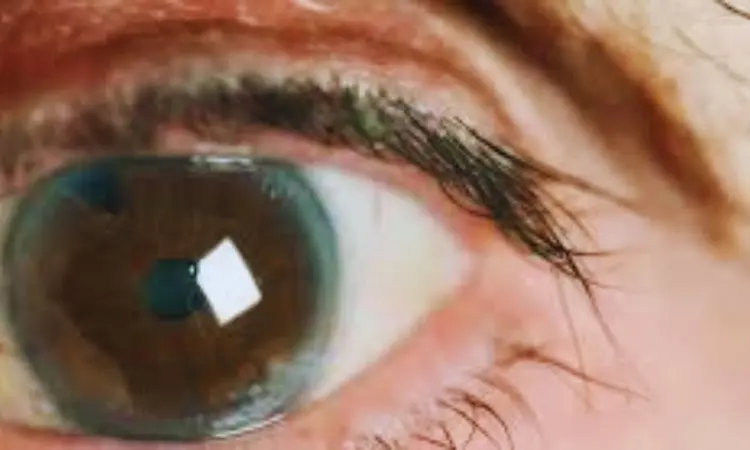- Home
- Medical news & Guidelines
- Anesthesiology
- Cardiology and CTVS
- Critical Care
- Dentistry
- Dermatology
- Diabetes and Endocrinology
- ENT
- Gastroenterology
- Medicine
- Nephrology
- Neurology
- Obstretics-Gynaecology
- Oncology
- Ophthalmology
- Orthopaedics
- Pediatrics-Neonatology
- Psychiatry
- Pulmonology
- Radiology
- Surgery
- Urology
- Laboratory Medicine
- Diet
- Nursing
- Paramedical
- Physiotherapy
- Health news
- Fact Check
- Bone Health Fact Check
- Brain Health Fact Check
- Cancer Related Fact Check
- Child Care Fact Check
- Dental and oral health fact check
- Diabetes and metabolic health fact check
- Diet and Nutrition Fact Check
- Eye and ENT Care Fact Check
- Fitness fact check
- Gut health fact check
- Heart health fact check
- Kidney health fact check
- Medical education fact check
- Men's health fact check
- Respiratory fact check
- Skin and hair care fact check
- Vaccine and Immunization fact check
- Women's health fact check
- AYUSH
- State News
- Andaman and Nicobar Islands
- Andhra Pradesh
- Arunachal Pradesh
- Assam
- Bihar
- Chandigarh
- Chattisgarh
- Dadra and Nagar Haveli
- Daman and Diu
- Delhi
- Goa
- Gujarat
- Haryana
- Himachal Pradesh
- Jammu & Kashmir
- Jharkhand
- Karnataka
- Kerala
- Ladakh
- Lakshadweep
- Madhya Pradesh
- Maharashtra
- Manipur
- Meghalaya
- Mizoram
- Nagaland
- Odisha
- Puducherry
- Punjab
- Rajasthan
- Sikkim
- Tamil Nadu
- Telangana
- Tripura
- Uttar Pradesh
- Uttrakhand
- West Bengal
- Medical Education
- Industry
Metabolic Syndrome Increases Cataract Risk, Especially in 50 + Individuals: Study

Individuals with metabolic syndrome (MetS) face an elevated risk of developing cataracts. In this meta-analysis of 379,464 individuals, cataract risk was 28% higher in those with MetS. The risk was more pronounced in adults over 57 years old and when utilizing the “International Diabetes Federation” criteria for diagnosis. Managing metabolic health may reduce cataract risk, especially in the aging population
Metabolic syndrome (MetS) has been suggested to be associated with an increased risk of cataract in adults. However, the evidence remains inconclusive. This meta-analysis aimed to clarify this potential association.
They conducted a systematic search of PubMed, Embase, and Web of Science up to July 31, 2024, for observational studies evaluating the association between MetS and cataract. Data were pooled using a random-effects model to calculate risk ratios (RR) with 95% confidence intervals (CI). Heterogeneity was assessed with the Cochrane Q test and I² statistics. Subgroup analyses were performed based on study characteristics. Results: Ten studies with 379,464 participants were included.
The meta-analysis showed that MetS was significantly associated with an increased risk of cataract (RR: 1.28, 95% CI: 1.16–1.41, p < 0.001; I² = 90%). Subgroup analyses indicated that the association was stronger in participants aged ≥57 years compared to those <57 years (p for subgroup difference <0.001) and in studies using the International Diabetes Federation criteria for MetS diagnosis compared to the National Cholesterol Education Program criteria (p for subgroup difference <0.001). No significant differences were found by geographic region, sex, or cataract types. Sensitivity analyses confirmed the robustness of these findings. Egger’s regression test showed no significant publication bias (p = 0.44). MetS is associated with an increased risk of cataract in adults, particularly in older populations. Further studies are needed to explore the underlying mechanisms and develop prevention strategies.
Reference:
Liu, C., Zhang, Y., Cao, X. et al. Association between metabolic syndrome and cataract: a meta-analysis. Eye (2025).https://doi.org/10.1038/s41433-025-03910-2
Dr. Shravani Dali has completed her BDS from Pravara institute of medical sciences, loni. Following which she extensively worked in the healthcare sector for 2+ years. She has been actively involved in writing blogs in field of health and wellness. Currently she is pursuing her Masters of public health-health administration from Tata institute of social sciences. She can be contacted at editorial@medicaldialogues.in.
Dr Kamal Kant Kohli-MBBS, DTCD- a chest specialist with more than 30 years of practice and a flair for writing clinical articles, Dr Kamal Kant Kohli joined Medical Dialogues as a Chief Editor of Medical News. Besides writing articles, as an editor, he proofreads and verifies all the medical content published on Medical Dialogues including those coming from journals, studies,medical conferences,guidelines etc. Email: drkohli@medicaldialogues.in. Contact no. 011-43720751


